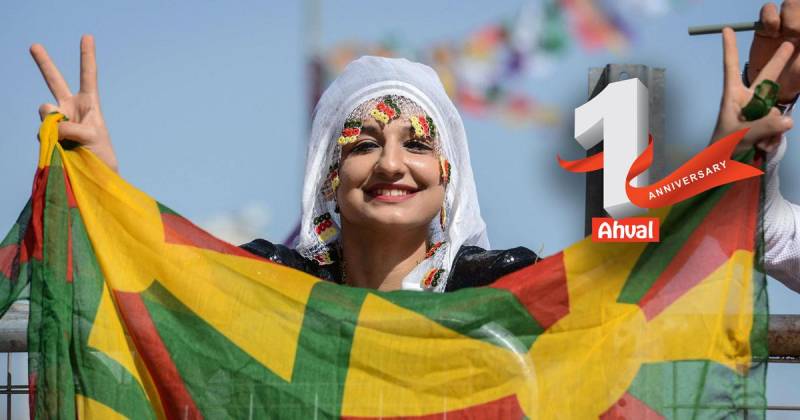For the Kurds, it has been another difficult year in all four parts of Kurdistan.
The developments in the region, following the Sept. 25 independence referendum held by Iraq’s Kurdistan Regional Government, were clear indications of what would happen to the Kurds if they lay claim sovereignty over their own lands. Before the referendum, pro-government Turkish newspapers warned the region’s president Masoud Barzani: “You asked for it Barzani”; “Israel cannot save Barzani”; “The referendum is invalid”; and “Let Barzani think about the aftermath”.
The Turkish Islamist daily Akit went even further and published a cartoon of Barzani beheaded.
Turkish President Recep Tayyip Erdoğan was furious and declared the overwhelming vote for independence as illegitimate. He warned he would shut off the taps on a major pipeline carrying oil from Iraqi Kurdish-controlled areas to the Turkish coast.
“We have the control over the pipeline, let’s see to who they will sell the petrol to?” Erdoğan roared. “We may come one night unexpectedly,” he said, threatening military operations. Erdoğan’s even called Barzani a dog.
Meanwhile, the racist, nationalist and chauvinist rhetoric of Turkey’s leftist main opposition Republican People’s Party came as no surprise to Kurds.
After the referendum, the threats from Turkey, Iran and Iraq, the deployment of Iraqi government troops on the border crossing with Turkey, the Kurds’ loss of control over the city of Kirkuk and its oilfields reversed gains made over decades. They were, in some sense, the results of the divisions between the Kurds.
In January, Turkish forces and their Syrian Islamist rebel allies launched “Operation Olive Branch”, an offensive to seize the Kurdish-controlled northern Syrian district of Afrin. The Turkish media were on duty again: “The Turkish nation backs you”, “Blessed be our holy war” and “We hit the traitors”, screamed the headlines.
Afrin, a city of 1 million inhabitants and refugees from elsewhere in Syria was captured and hundreds of thousands of Kurds were forced to leave their homes. Many people, including myself, who opposed the Afrin operation, were taken into custody and openly targeted by the media.
Meanwhile, nearly every day Turkish warplanes took off from Diyarbakir, my hometown to support Turkish forces in Syria. Dozens of Kurdish settlements were declared military zones and off limits. Forest fires broke out in areas where the Turkish military fought the Kurdistan Workers’ Party (PKK).
Neither the death toll of soldiers, nor the PKK fighters in known. Thus, we are left to count the number of funerals in the region, though several bodies may not have been recovered. According to a report by the Diyarbakır Chamber of Human Rights Association in the first half of 2018, 51 soldiers or police officers and 132 armed militants lost their lives in the region.
On the eve of celebrations of the Kurdish new year (Newroz), the destruction of the statue of Kurdish resistance symbol, Kawa the blacksmith, in the centre of Afrin by the Turkish-backed Syrian groups fuelled the anger of many Kurds.
Despite the pressures, tens of thousands turned out for Newroz celebrations in many cities across Turkey. But the enthusiasm of the crowds was not like previous years. In the Newroz speeches, speakers emphasised the unity and solidarity, but hopes for an alliance of Kurdish parties in Turkey’s June 24 general elections failed.
The Supreme Electoral Council relocated many polling stations in Kurdish cities, forcing some 170,000 voters to cast their ballots away from their own neighbourhoods or hometowns.
Pro-Kurdish Peoples’ Democratic Party (HDP) passed the 10 percent election threshold to enter parliament, but Erdoğan’s presidential election victory deepened the desperation felt by Kurds. The imprisonment of experienced Kurdish politicians has weakened the influence of Kurdish parties and Kurdish people’s trust in politics has declined dramatically.
In the last year, the demolition has almost ended of buildings damaged in urban fighting between security forces and Kurdish militants in the winter of 2015 to 2016. Turkey’s Public Housing Development Agency has built dozens of high rise blocks in the southeastern cities of Cizre, Nusaybin, Diyarbakır, Yüksekova and Şırnak. Bodies continue to be found during construction. Some are sent to forensics to be identified, but others join the ranks of graves of the nameless. Some Kurds call this bout of fighting the “city wars”, while others call it “the great war”. The question why it happened is still waiting to be answered. The Kurds are angry, their hearts are broken. The heartbreak will be passed on to the next generations and will lessen the possibility of living together in peace.
Nov. 1 was the second anniversary of the government’s appointment of administrators to take control of Kurdish cities, most notably Diyarbakır, from their elected mayors. Kurds are living in the shadows of Turkish flags, tanks and police. It is a life where Kurdish civil society organisations have been closed, women’s organisations shut down, Kurdish representatives are imprisoned, cultural centres abolished, Kurdish street names to the Turkish ones, parts of cities blocked by barricades and even the children’s tombstones destroyed.
With or without central government-appointed administrators, the will of Kurds is still ignored. It does not matter which country they live in. The story of the Kurds has not changed for a century. This is a story moulded by blood, cruelty, agony and struggle. A century-old denial continues. But we do not disappear just because they say we do not exist.
